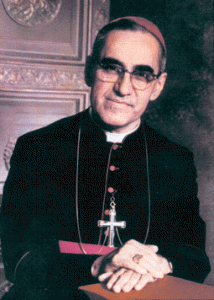Oscar Romero was born in 1917 and taken away in 1980. He was appointed Archbishop in 1977. Before he served his term, the Church in Central America was being protested by two political ideals. One was those priests who wanted non-confrontation with the Church and the state. And those who thought the Church should have say in the government and what it was doing. Romero was chosen because he was thought to be a “middle man” whom all could agree with.
Although, soon after being appointed Romero’s close, personal friend Father Rutillo Grande was assassinated by the government’s  soldiers. Obviously, this had a significant and intense effect on his life, changing him from a moderate and equal lookout to a ferocious and impetuous activist against injustice. His dramatic and passionate change in view shows how if you put your mind behind what you believe you can touch people’s lives and really get things done. As a gesture to his dead friend, Romero refused to appear in any public ceremonies with Army or Government personnel until he thought the true nature of his friend’s murder was brought to public attention and desired social changes were noticeable. Never before had a church official, with such high rank, made such a statement.
soldiers. Obviously, this had a significant and intense effect on his life, changing him from a moderate and equal lookout to a ferocious and impetuous activist against injustice. His dramatic and passionate change in view shows how if you put your mind behind what you believe you can touch people’s lives and really get things done. As a gesture to his dead friend, Romero refused to appear in any public ceremonies with Army or Government personnel until he thought the true nature of his friend’s murder was brought to public attention and desired social changes were noticeable. Never before had a church official, with such high rank, made such a statement.
After he dealt with the death of a close religious friend he experienced the loss of a close social friend, Lucia. These two knew each other for a long time, and had ancestral ties. The death of her truly meant certain death to a part of him. Both his religious and social walls had been knocked down by the government and he was becoming continually frustrated and fed-up at this point. When he was stripped in the village it is suitable to compare him to Jesus Christ. It is in the bible where too, Jesus is stripped of his clothing in public in order to embarrass and ridicule him in front of his followers and tyrants. They both fought for their beliefs and in the end won. Although, both lost their lives, we try to continually preach their messages and in doing are “living their memory.”
On January 8, 1978, he is proclaiming the real core of what his whole crusade against injustice is all about. He goes on to talk about how we must all give to the action of making peace in order for it to be peaceful for all. He talks about how peace is giving to one another and peace is dynamic. Which means peace is alive, peace is vigorous and it is inside all of us, we just need to give it to each other. Romero soon became the voice of El Salvador. His words and actions crossed international borders. But as he spoke it became harder for the government to terrorize and torture in the watchful eyes of the world. On March 24, 1980, in a small chapel as he was performing mass, Romero was struck from the back of the church by a gunshot straight to the chest, killing him instantly. This deeply saddened the peaceful activists in El Salvador and people, still today, try to live on and bring his hopes to reality. His life was taken, but his voice cannot be silenced
